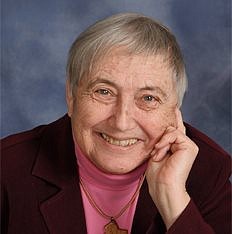January 16, 2019 at 9:13 p.m.
Images of endless war, overflowing refugee camps, hate-filled terrorists, billion-dollar weapons, starved children — I want to flee this world’s violence.
So I ask my prayer group, women who, like me, have lived through many decades totally safe from such horrible experiences: “What am I to do?”
Eighty-five-year-old Pat says, “I’m reading the letters of Etty Hillesum.” I recall from a long-ago reading of An Interrupted Life that Etty died in a concentration camp during the Holocaust.
Pat explains that while imprisoned by German invaders in Westerbork, a concentration camp near her Netherlands home, Etty wrote numerous letters to family and friends. While daily she watches as guards pack a train’s boxcars with human cargo bound for Austerlitz and death — simply for being Jews — she writes letters filled with stories of men and women doing good.
I find a library copy of Etty’s book.
Throughout, Etty describes the human suffering but also the human goodness that happens day after day, week after week, month after month, as the trains come, again and again. I ponder Etty’s words: “Despite everything, life is full of beauty and meaning.” And, “We have been marked by suffering for a whole lifetime. And yet life in its unfathomable depths is so wonderfully good.”
One day it is Etty’s turn to board her boxcar on the train that also carries her parents to Austerlitz. In her final written words, discovered on a postcard she throws from the moving train, Etty, a woman of deep spirituality, quotes Scripture: “The Lord is my high tower.” Of herself and her mother and father, weakened and ill after their Westerbork life of near starvation, exposure to extreme heat, cold, overcrowded rooms and mattress-less bunks, Etty proclaims: “We left the camp singing.”
I ask myself, can Westerbork, a place of unimaginable human suffering, be a “sacred place,” “holy ground,” perhaps more so than the pure, placid, peaceful church or synagogue or mosque or temple space?
Can I imagine Syria, or Afghanistan, or Yemen, or Sudan, or Somalia or a refugee camp holding 180,000, places of war and famine, death and starvation, as places where human goodness endures, as sacred places “full of meaning and beauty,” where angels and humans are singing a chorus of beauty in the midst of ugliness?
This is a struggle in two ways. First, I know belief in human goodness everywhere must not blind me to the horrors of violent war, of raging famine. I must not be a Pollyanna, must never stop my efforts to end endless war, to assist refugees and victims of famine, to resist injustice, including my own, in its many forms.
Yet I must at the same time know that I am walking in a sacred space with truly holy men and women in war zones and refugee camps, doing endless acts of human kindness, of love, amidst their suffering, even their suffering unto death.
Second, like Etty, I must face my willingness to construct walls around my comforting image of “sacred space,” my letting into the sacred space only the imprisoned, the suffering, while excluding the “other,” the perpetrators of the violence — the enemy. Etty struggles with God’s command to love all in a much more difficult situational barrier to oneness. She refuses to let hate into her heart. Of the guards she says, “I have never been so frightened of anything in my life. I sank to my knees with the words that preside over human life: ‘And God made man after His likeness.’ That passage spent a difficult morning with me.”
So in my born-a-Catholic heart I must struggle with “Love your enemies.” “They know not what they do.” “I have come to save sinners.” In God, there is only one sacred space.
Like most 21st-century religious pushing 80, I am called by the new creation story, new science, new theology. I am learning of the “oneness” that in recent years scientists and theologians pose as the heart of reality.
Since 2000, my community has called me to prayer that seeks oneness, communion: centering prayer, contemplative prayer, even mystical prayer. In this world so fractured, so full of noise, religious community members, like so many others, are seeking to find that deep silence, deep prayer, deep connection with God, so essential to knowing our oneness with God and all that is in God, and bringing that oneness to all.
So with Etty’s help, I reconstruct my image of sacred space. Can I in my heart hold all as sacred? Each night in my prayer, I wrap God’s encircling, unconditional love around the suffering and the inflictors of the suffering, and, yes, they are one with me.
Sister Francine Dempsey is a Sister of St. Joseph of Carondelet. This essay appears in “Soul Seeing,” a new collection of 56 columns originally published in the National Catholic Reporter and now published in one volume by Orbis Books. For more information, visit www.orbisbooks.com/soul-seeing.html.
- Colorado diocesan-sponsored clergy peer support, resiliency program believed to be first in nation
- Supreme Court temporarily blocks California policy against parental notification of gender identity
- Vatican synod study group proposes creation of pontifical commission for new technologies
- Young Catholics want doctrinal clarity, not adaptability, Irish bishop says
- Church can teach what’s at stake when nations choose war, not peace, cardinal says
- 5 saintly role models we need to help us overcome today’s problems
- Lebanese archbishop: Innocents are ‘paying the price’ of Middle East war
- Honolulu Diocese expands footprint in city’s downtown with purchase of historic building
- Experts: Debates about Zionism, even by Catholics, often at odds with Catholic understanding
- From Algeria to Angola, Africans hope message of peace, dialogue will resonate during papal trip








Comments:
You must login to comment.